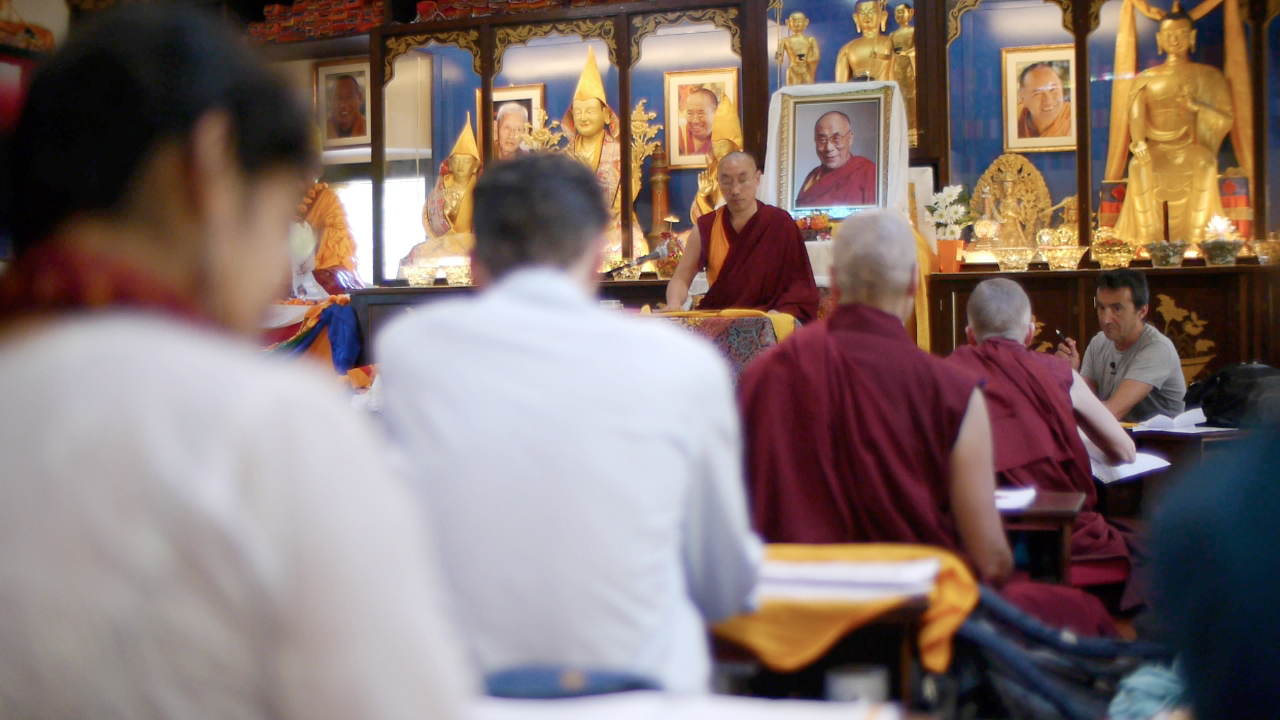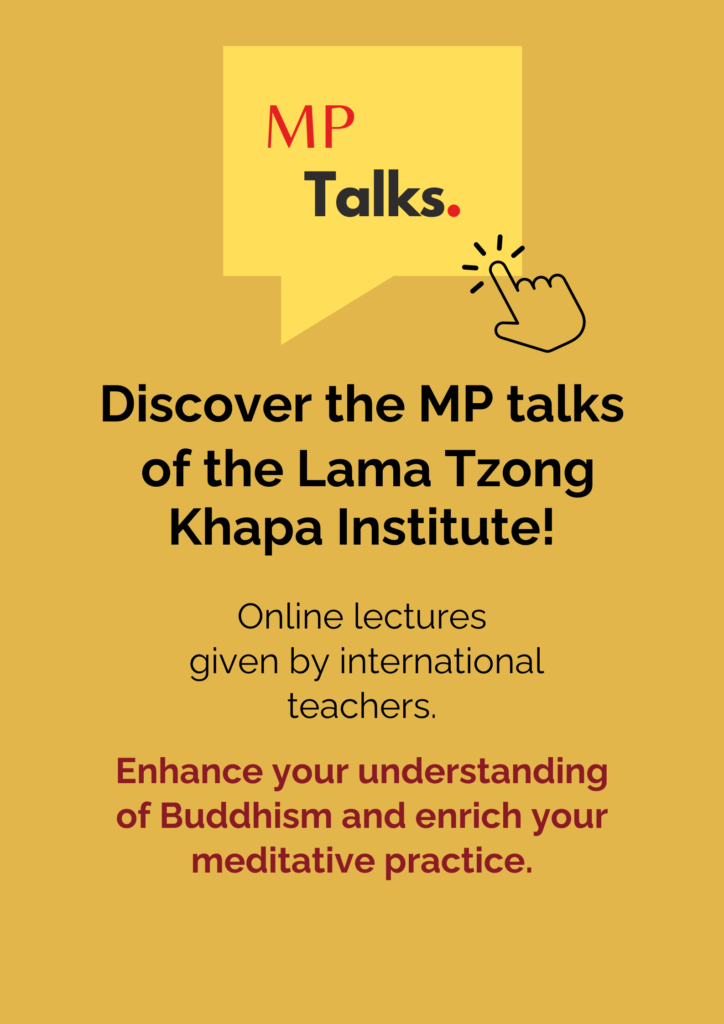Madhyamaka – Study of the Middle Way
New subject – February 2025 – June 2026
Enrolment now open – Residential and Online
Istituto Lama Tzong Khapa is pleased to offer an extraordinary and rare opportunity to undertake in-depth study of the view of emptiness according to the Middle Way (Madhyamaka), as presented in the treatises of the Masters of the Nalanda Tradition.
- In-depth Study of Emptiness:
Immerse yourself in the understanding of emptiness of the Madhyamaka-Prasangika system as expounded by Chandrakirti in his Supplement to the ‘Middle Way.’ - Discover the Great Compassion and the Ten perfections:
Explore the connection between the realization of emptiness, the development of great compassion, and the precious mind of enlightenment as they are developed along the ten bodhisattva grounds, each emphasizing the practice of a particular perfection. - Structured Curriculum:
Follow a meticulously designed curriculum that systematically unravels the complexities of the text, ensuring a structured and coherent learning experience. - Practical application for personal development:
Move beyond just a theoretical understanding of the text as the course emphasizes practical applications with daily meditations and regular advice on how to apply the teachings into daily life.
The Middle Way studies enable us to develop our wisdom in order to eliminate the ignorance that misconceives reality and causes us to suffer, filling our lives with dissatisfaction. Understanding reality can lead us to reduce and ultimately eliminate our mental afflictions, leaving our mind more peaceful and happy. Finally, with the precious mind of bodhicitta, one can achieve enlightenment for the benefit all sentient beings.
The course is taught by our resident Lharampa Geshe Jampa Gelek, following Lama Tsongkhapa’s masterpiece, the Illumination of the Thought. This text flawlessly explains Candrakīrti’s renown treatise, the Supplement to the Middle Way (Madhyamakāvatāra), which in turn is a supplement to Nāgārjuna’s seminal Madhyamaka treatise, the Fundamental Wisdom of the Middle Way (Mūlamadhyamakakārikā).
Lama Tsongkhapa’s text, composed one year before his death, is recognised within the Tibetan tradition as his final and most profound exposition on the difficult points on emptiness. As such, it is considered a key text of the Madhyamaka studies in all Gelug Monastic Universities.
Candrakīrti’s treatise, which forms the basis for Lama Tsongkhapa’s explanation and commentary, provides an examination of the ten perfections, with a particular emphasis on the perfection of wisdom. It engages in a comprehensive examination of the various reasonings on emptiness in accordance with the Prāsaṅgika school of thought by way of rigorous debate with other Buddhist and Non-Buddhist philosophical views. The result is a profound and in-depth discussion that enables students to improve and deepen their own understanding of emptiness in order to have a more accurate and refined meditative experience.
THE FPMT MASTERS PROGRAM IN BUDDHIST STUDIES OF SUTRA AND TANTRA.
A rare opportunity to:
- Immerse yourself in an intensive, six-year program of study and practice in the Gelug tradition of Tibetan Buddhism
- engage in comprehensive study of the great texts of the Nalanda Tradition with qualified Tibetan teachers and Western teaching assistants and tutors
- integrate study and meditative practice through regular lamrim retreats
- experience an approach to Dharma that combines study, practice, and service
- receive teachings, empowerments, and commentaries from eminent visiting lamas
- engage with prominent Buddhist scholars and academics
- profoundly extend your knowledge and understanding of the Dharma
- deepen your practice and enhance your ability to share and teach Dharma
The FPMT Masters Program is the FPMT’s most advanced education program, inspired by the geshe studies programs in the traditional Gelug monastic universities. Taught by a fully-qualified teacher with the assistance of experienced staff, the program offers in-depth study and extensive retreat experience, providing a thorough grounding in sutra and tantra. It is a uniquely inspiring and fulfilling way for both ordained and lay Buddhists to learn and practice the Dharma.
The program was born out of the exceptional vision of Lama Thubten Yeshe, first realized by Geshe Jampa Gyatso and developed into the form of the current curriculum by FPMT Education Services under the guidance of Lama Zopa Rinpoche.
The full-time, residential program consists of six years of study and one year of retreat. Quizzes, written exams, review classes, meditations and discussions support the daily teachings. Criteria for certification include academic, meditation, training, behavior, and service components as well as a minimum attendance in the various aspects of the program.
For students who are unable to join the residential program, the FPMT Masters Program Online (MPOL) offers the opportunity to complete the study all FPMT Masters Program subjects under the guidance of qualified MP tutors.
The FPMT Masters Program completion certificate, the highest educational achievement within FPMT, is issued by FPMT Education Services upon completion of all components of the program. FPMT Masters Program graduates are eligible to become FPMT registered teachers.
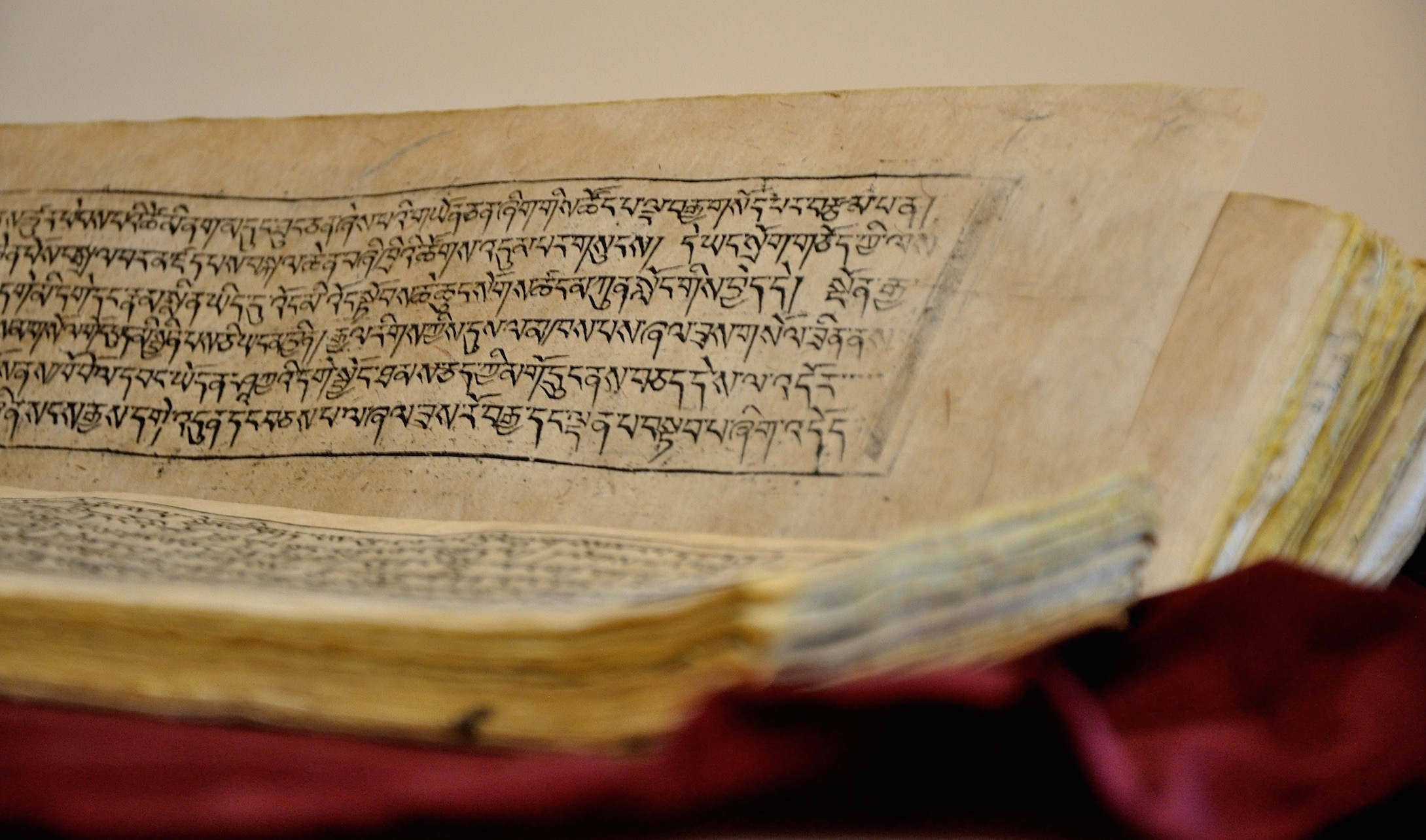
Students study six principal subjects, receiving teachings and oral transmissions based on the main texts and their principal Gelug commentaries, from geshes who are qualified lineage-holders. When time permits, the teacher may supplement the teachings with additional texts and commentaries.
The FPMT Masters Program curriculum consists of the following subjects and texts:
- Ornament for Clear Realization (Abhisamayalamkara)
- Supplement to the ‘Middle Way’ (Madhyamakavatara)
- Commentary on Valid Cognition (Pramanavarttika)
- Treasury of Knowledge (Abhidharmakosha)
- Grounds and Paths of Secret Mantra
- The Two Stages of Guhyasamaja Tantra
It is also possible to enroll in individual subjects.
Ornament for Clear Realization (Abhisamayalamkara)
February 2023—December 2024
Maitreya’s root text presents the stages of clear realization gained on the various spiritual grounds and paths of hearers, solitary realizers, and bodhisattvas that lead to the attainment of omniscience, as well as detailed explanations of fundamental Buddhist topics such as bodhichitta, the Three Jewels, the two truths, the four noble truths, and the four Buddha bodies.
Main texts:
- Ornament for Clear Realization by Maitreya
- The Commentary: Clear Meaning by Haribhadra
- The Explanation: Ornament of the Essence by Gyeltsab Je
Supplement to the ‘Middle Way’ (Madhyamakavatara)
February 2025—June 2026
Chandrakirti’s treatise extensively presents the ten perfections, with specific emphasis on the perfection of wisdom and the many reasonings of the Consequentialist (Prasangika) school for understanding emptiness, as well as other Buddhist and non-Buddhist schools of thought.
Main texts:
- Supplement to the ‘Middle Way’ by Chandrakirti
- Explanation of the ‘Supplement to the “Middle Way”’ by Chandrakirti
- Illumination of the Thought: An Extensive Explanation of Chandrakirti’s “Supplement to the ‘Middle Way’” by Lama Tsongkhapa
Treasury of Knowledge (Abhidharmakosha)
September 2026—December 2026
Vasubandhu’s Treasury of Knowledge is a vast description of the outer and inner world according to Buddhism—the various types of migrating beings and realms and their causes, actions and afflictions, minds and mental factors, and the spiritual paths and persons who traverse them.
The teachings on the Treasury will focus mainly on the chapter presenting actions (karma) and afflictions and will be based on the First Dalai Lama, Gedun Drub’s Clarifying the Path to Liberation: An Explanation of the ‘Treasury of Knowledge’.
Main texts:
- Treasury of Knowledge by Vasubandhu
- Clarifying the Path to Liberation: An Explanation of the ‘Treasury of Manifest Knowledge’ by Gedun Drub, the First Dalai Lama
Commentary on Valid Cognition (Pramanavarttika)
February 2027—June 2027
Dharmakirti’s Commentary on Valid Cognition is a fundamental treatise on Buddhist logic and epistemology, presenting the reasons that prove the possibility of past and future lives, liberation, buddhahood, and so forth through “valid cognition” (pramana).
The teachings on Valid Cognition will focus on logical inference and the establishment of valid authority, and are presented on the basis of Gyaltsab Je’s Elucidating the Path to Liberation, a detailed explanation of the Pramanavarttika
Main texts:
- Commentary on Valid Cognition by Dharmakirti
- Elucidating the Path to Liberation According to the Pramanavarttika by Gyeltsab Je
Grounds and Paths of Secret Mantra
September 2027—December 2027
Students will study commentaries including Ngawang Palden’s Illumination of the Texts of Tantra to get an overview of the essential points of the four classes of tantra, with particular emphasis on the spiritual grounds and paths of highest yoga tantra.
Main texts:
- Illumination of the Tantric Tradition: The Principles of the Grounds and Paths of the Four Great Secret Classes of Tantra by Choje Ngawang Palden
- Great Exposition of the Stages of Mantra by Lama Tsongkhapa
PLEASE NOTE THAT ADDITIONAL REQUIREMENTS ARE NECESSARY TO STUDY Grounds and Paths of Secret Mantra. PLEASE CHECK THE REQUIREMENTS SECTION.
The Two Stages of Guhyasamaja Tantra
February 2028—Decemmber 2028
The class will focus on in-depth analysis of the generation and completion stages of highest yoga tantra, based on the Guhyasamaja Tantra, using commentaries such as Lama Tsongkhapa’s Lamp to Illuminate the Five Stages.
The presentation of the generation stage includes an explanation of the visualization and generation of the mandala and deities and how to carry death, the intermediate state, and rebirth into the path.
The presentation of the completion stage discusses the six branches: the isolation of body, isolation of speech, isolation of mind, illusory body, actual clear light, and the union of clear light and the illusory body.
Main texts:
- A Lamp to Illuminate the Five Stages: Core Teachings on the Glorious Guhyasamāja, King of Tantras by Lama Tsongkhapa
- A Guide to the Generation Stage Path of Guhyasamaja Called “Sacred Words of Akshobhya” by Aku Sherab Gyatso
- A Memorandum to the Expository Commentary on the Five Stages of the Completion Stage of Glorious Guhyasamaja Called “Nectar From the Mouth of Akshobhya” by Aku Sherab Gyatso
- Self-generation Rite of the Glorious Secret Assembly, The King of Tantras: Arranged for Convenient Recitation in Accordance with the Oral Tradition of the Jang Tse College of Ganden
PLEASE NOTE THAT ADDITIONAL REQUIREMENTS ARE NECESSARY TO STUDY THE TWO STAGES OF GUHYASAMAJA TANTRA. PLEASE CHECK THE REQUIREMENTS SECTION.
AFTER THE CONCLUSION OF THE STUDIES, THERE WILL BE A THREE-MONTH REVIEW PERIOD AND FINAL EXAM
ANNUAL SCHEDULE
In each calendar year, FPMT Masters Program classes are suspended two months for summer vacation (from the end of June until the beginning of September) and one month at Christmas (from mid-December until mid-January), with a study-break of one week immediately following the Easter weekend. A lam rim retreat will be scheduled each year from mid-January to the beginning of February the first year and mid-February the following years. In addition, classes stop for a few days around the Tibetan new year (Losar), which falls in February or March. Resident students are welcome to remain at the Institute during these breaks, whereas the student housing rates do not apply during the summer months.
WEEKLY SCHEDULE
Teachings with the principal teacher will be held five days a week, from Monday to Friday. The schedule for review classes, discussion groups, and group meditations will be decided in conjunction with the MP staff.
Geshe Jampa Gelek
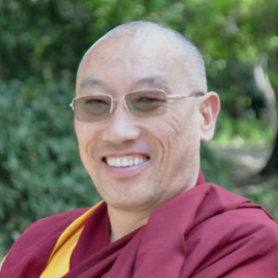
Lharampa Geshe Jampa Gelek, the Institute’s experienced Masters Program teacher, was born in 1966 in the eastern region of Kham, Tibet, and decided very early on to become a monk. At the age of 16 he left Lhasa, following the Chinese invasion (1959), and went to India. He studied at Sera Je Monastic University where he was ordained as a Gelong monk at the young age of 19. His Holiness the Dalai Lama and Choden Rinpoche are his main teachers.
Geshe Jampa Gelek completed his monastic education at Sera-Je monastery in South India in 1999, graduating first of his class. Geshe Jampa Gelek is much appreciated for the great depth and detail of his presentations and his ability to enrich his teachings with an extensive knowledge of multiple commentaries, granting the FPMT Masters Program an exceptional level of erudition and knowledge.
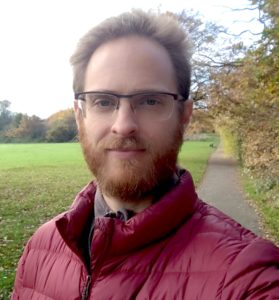 Shahar Tene was born in Israel but has lived in the UK for most of his life. He holds an MSc in Physics from the University of Reading, an MA in Philosophy from King’s College London, and did postgraduate studies at SOAS, London. Shahar has been a student and practitioner of Buddhism since 2007, starting with various courses at Tushita and Root Institute in India. In 2014 he completed the residential FPMT Basic Program at ILTK, with its Master’s in Wisdom university accreditation and three months of meditation retreat. He also completed parts of the FPMT Masters Program, and is an FPMT registered teacher. Shahar has since been focusing on Tibetan Language, graduating from the Lotsawa Rinchen Zangpo Translator Program in 2020, after which he worked as a Tibetan to English interpreter both online and at centers such as Thosamling Institute in Dharamsala, India. Shahar returned to ILTK in 2023 where he is the interpreter of the FPMT Masters Program.
Shahar Tene was born in Israel but has lived in the UK for most of his life. He holds an MSc in Physics from the University of Reading, an MA in Philosophy from King’s College London, and did postgraduate studies at SOAS, London. Shahar has been a student and practitioner of Buddhism since 2007, starting with various courses at Tushita and Root Institute in India. In 2014 he completed the residential FPMT Basic Program at ILTK, with its Master’s in Wisdom university accreditation and three months of meditation retreat. He also completed parts of the FPMT Masters Program, and is an FPMT registered teacher. Shahar has since been focusing on Tibetan Language, graduating from the Lotsawa Rinchen Zangpo Translator Program in 2020, after which he worked as a Tibetan to English interpreter both online and at centers such as Thosamling Institute in Dharamsala, India. Shahar returned to ILTK in 2023 where he is the interpreter of the FPMT Masters Program.
English and Italian residential MP teaching assistant and English MP Online tutor
 Ven. Losang Gyaltsen has kindly accepted to be the Teaching Assistant and Tutor for the FPMT Masters Program at ILTK from September 2024 onward, starting with Middle Way and for the duration of the program.
Ven. Losang Gyaltsen has kindly accepted to be the Teaching Assistant and Tutor for the FPMT Masters Program at ILTK from September 2024 onward, starting with Middle Way and for the duration of the program.
After connecting with Buddhism when he was 23 years old, he started studying in Centre Kalachakra in Paris in 2002. He left Paris to spend a year as volunteer in Institut Vajra Yogini near Toulouse in the South of France, before joining the FPMT Basic Program at nearby Nalanda Monastery. He completed the program and the three month retreat, to become a graduate in 2012.
Ven. Gyaltsen was ordained as a getsul in 2010, and became a gelong (fully ordained monk) in 2014. In 2013 he was appointed to be Nalanda Monastery’s director, and successfully fulfilled that function for many years, while also attending Nalanda’s first FPMT Masters Program.
At the request of Centre Kalachakra Ven. Gyaltsen became an FPMT Registered Teacher in 2015, and by 2017 was also registered as a Long Retreat Leader and as Living in the Path facilitator, supporting both the city center and the retreat center as much as possible. In 2020, when the MP study component was finished, he left Nalanda Monastery for Kalachakra Retreat Center, to do the required year-long lamrim retreat that completes an MP. Having graduated after one year of retreat, at the advice of Lama Zopa Rinpoche, he continued his lamrim retreat while combining it with teaching and guiding retreats and caring for his father who lives nearby.
FPMT Masters Program Admission Criteria
Prospective students should be aware that the MP is an intensive program that is intellectually challenging and highly scholastic, requiring a great deal of application and commitment, especially for those who have not previously studied Tibetan Buddhist philosophical texts. Previous academic or philosophical training is not a strict requirement, but applicants should be willing to put a substantial amount of time into their studies, and to be aware that many things will only become clear over time, with patience, diligent study, and reflection.
- Applicants must have a good foundation in the study and practice of teachings on the Stages of the Path and Mind Training, as the material studied in the MP is difficult to apply to one’s practice and daily life without such a basis. Ideally, students should have completed at least one of the FPMT education programs, such as the Basic Program or Discovering Buddhism.
- The FPMT Basic Program subjects Mind and Cognition and Tenets are mandatory prerequisites for admission to the program. While it is best to have studied these subjects at a center, they can also be studied online at the FPMT Online Learning center.
Additional Requirements for the Tantra Subjects
- In order to study Grounds and Paths of Secret Mantra, it is necessary to have received a highest yoga tantra empowerment (such as Yamantaka, Chakrasamvara, etc.) from a qualified lama. Such an empowerment includes taking the bodhisattva and tantra vows, and a commitment to the daily practice of the Six Session Guru Yoga.
- In order to study Guhyasamaja, it is necessary to have received the highest yoga tantra empowerment of Guhyasamaja from a qualified lama.
The Institute aims at providing opportunities for students to receive these empowerments during the program, before the start of the tantra subjects.
APPLICATION
To be considered for admission to the residential program, applicants must submit their FPMT Masters Program application no later than 10 days before the start of the subject they wish to study. See “Residential Program: how to apply” for details.
For the online program, applications will be accepted up to 10 days before the start of the subject. See “Online Program: application” for details.
In addition to offering students a profound deepening of their Dharma understanding and practice, the Masters Program aims at providing the FPMT with highly qualified Western teachers of Buddhist theory and practice. The FPMT Masters Program was specifically created and developed in order to fulfill the wish of Lama Yeshe and Lama Zopa Rinpoche to specifically address centers’ need for qualified teachers, qualified both in terms of their academic knowledge and their exemplary conduct.
A FPMT Masters Program subject completion card indicates that a residential or online student has fulfilled the residential or online completion requirements for a specific subject.
A FPMT Masters Program subject participation card can be issued if the attendance or exam requirements are not met.
A FPMT Masters Program completion certificate is issued when a student has successfully completed all six subjects, the three-month review with essay assignments, and one year of lamrim retreat.
A FPMT Masters Program homestudy completion certificate is issued when a student has successfully completed all six subjects (according to the MP Online requirements), the three-month review with essay assignments, and one month of lamrim retreat upon completion of the review.
Criteria for subject completion include evaluation of students’ academic performance based on participation in quizzes and exams, appropriate ethical conduct, contemplative practice, and service components, as well as regular attendance in the various aspects of the program.
All Masters Program graduates, both from MP Online and from the residential, full-time MP, are eligible for the FPMT teacher registration process. The former can become Foundational level, the latter either Foundational or In-Depth level FPMT registered teachers, to be invited to teach at those levels in FPMT centers.
Note that an MP completion certificate does not automatically qualify a graduate as an FPMT registered teacher. Upon graduation, students can request an application form from the FPMT Teacher Registration Committee and will then enter the application process, which needs to be successfully completed in order to become an FPMT registered teacher.
While it is possible to join the Masters Program mainly with one’s personal spiritual development in mind, without intending to graduate or become a teacher, residential students are expected to attend classes and retreats and to write all quizzes and exams, as they are intended to stimulate an in-depth review and study of the subject matter, and make the invaluable participation with fellow students possible.
The Masters Program arose from the unique vision of Lama Thubten Yeshe. Lama met Geshe Jampa Gyatso at Sera Monastery in Tibet in 1948, where they became dear friends, studying together for more than twenty years. After asking Geshe Jampa Gyatso to become resident teacher at Istituto Lama Tzong Khapa in 1980, Lama requested him to create a seven-year teacher training program, incorporating the major texts that form the basis of the sutra and tantra studies in Tibetan monasteries and tantric colleges. Geshe Jampa Gyatso agreed and taught three of the seven main subjects and several of the supplementary subjects throughout the years between 1983 and 1997, despite numerous interruptions.
After several years of planning by the FPMT and Geshe Jampa Gyatso, in consultation with Lama Zopa Rinpoche, the inaugural course of the Masters Program commenced in January 1998 with Geshe Jampa Gyatso as the resident teacher. It came to a successful conclusion in December 2004 with twenty-two students completing the entire program and another twenty-nine completing one or more of the five subjects. Among those who completed the entire program, many now work in FPMT centers as teachers, translators, interpreters and center staff, while the staff of ILTK’s bi-lingual residential and online Basic Programs and of the second residential and on-line Masters Programs consisted almost entirely of graduates from the first MP.
The second Masters Program began in January 2008, with Geshe Tenzin Tenphel teaching the Ornament for Clear Realization and Treasury of Manifest Knowledge, Khensur Jampa Tegchok teaching the Supplement to the “Middle Way”, and Geshe Jampa Gelek teaching the two Tantra subjects. The program concluded in December 2013, with twenty residential students completing the entire study program, forty-six completing one or more subjects, nine completing the entire course online, and fifty-seven completing one or more subjects online.
Francesca, MP edition 2015 – 2021: “I feel that having the opportunity to study the Master Program is a rare privilege and a wonderful gift that I have been offered by the Teacher, Geshe Gelek, by the tutor Christian and by all the wonderful staff at Istituto Lama Tzong Khapa. In this study program, we are given access to philosophical treaties that are the foundation of our Buddhist lineage; studying and understanding them allows us to follow the path of our teachers with clear understanding. And as we do so, we keep our lineage alive, we fulfil the wishes of our Teachers and preserve these rare teachings for future generations to come. But the most important benefit that I have received from the study of the Master Program was to learn how to apply this ancient wisdom in my daily life and how to transform my daily behaviour in order to be of benefit to other sentient beings and lead a more fulfilling life.”
For further information on the FPMT Masters Program, please contact the Education Office:
E-mail: segreteriadidattica@iltk.it
Office phone: (+39) 050-685009
